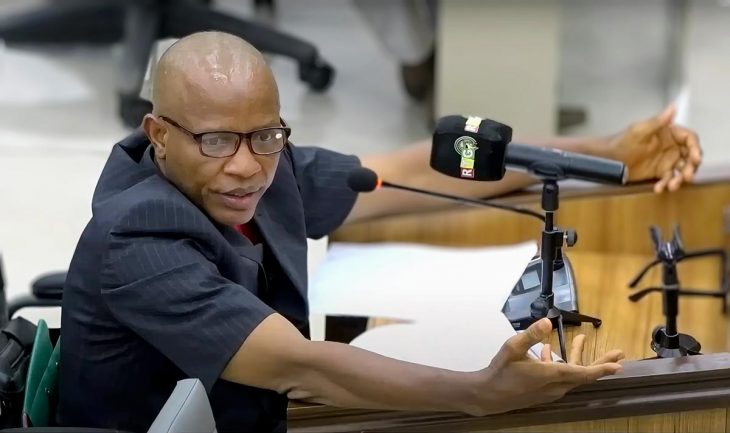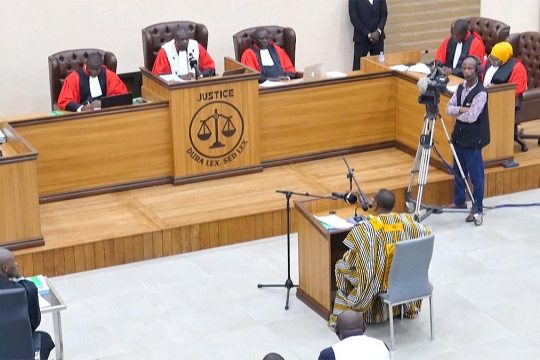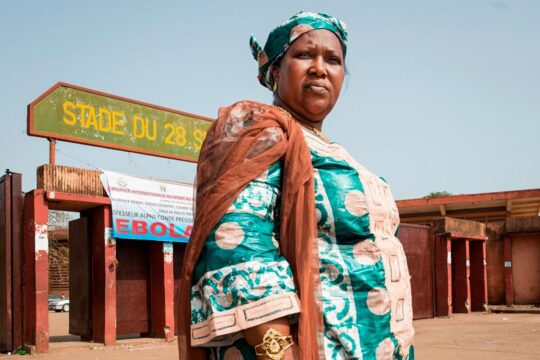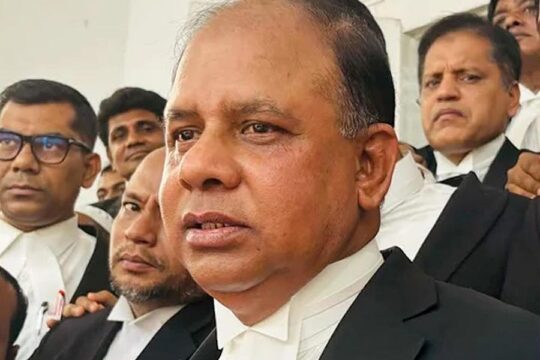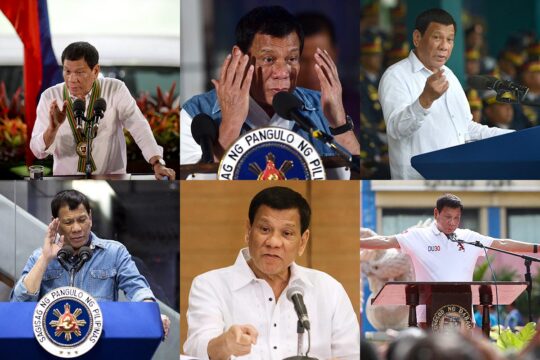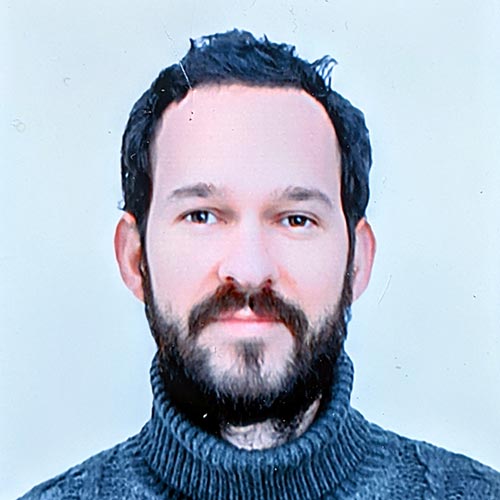During the first phase of the trial, which lasted nearly five months, the eleven defendants appeared one after the other, in animated but almost impeccably organized hearings.
Then on February 15, the court president called a victim to the stand for the first time. Ms. C. is a mother who claims to have been gang raped at the Conakry stadium on September 28, 2009. While her lawyers demanded that the case be heard behind closed doors, as allowed by the Guinean code of criminal procedure, court president Ibrahima Sory 2 Tounkara ordered an express first appearance in public. "Before the decision [to hear her in camera or not] is made, it should at least be possible for the civil party to appear, even if the merits of the case are not discussed," he said. "That's why we're going to ask Ms. C. to take the stand."
Filmed by all the media cameras in the country, she stepped forward in a blue-checked wrap. There was a ripple in the public stands. The prosecutor asked for the floor. "I would like to ask the press not to point their cameras at the person who is appearing,” he said. The president then seemed to realize what he had just done and exclaimed: "Let the press divert their cameras until the court has made its decision! If they can't divert them, then cut them off!"
Some channels stop broadcasting, others used just sound and a still, illustrated image. "It was I who wanted the meeting to be held in camera," said Mrs. C. to Tounkara, asking for that measure to be put in place. The public and journalists were invited to leave the room. But it was too late: Mrs. C. had been seen live on television and on the Internet. The court was the object of criticism. A Guinean news site headlined on "the irreparable error of the court", saying that "despite her wish to testify in camera, one of the rape victims (...) appeared in public".
“What happened is regrettable”
The court seems not to have anticipated this crucial stage. This is all the more difficult to understand given that the extreme sensitivity of the case is well known: at least one hundred women were raped by Guinean security forces at the stadium, according to the final report of an international commission of inquiry. And a few days before the opening of the trial, the authorities had speeded up adoption of a law that established rules for the protection of victims and witnesses.
"It is regrettable what happened," said Asmaou Diallo, president of the Association of Victims, Parents and Friends of September 28 (Avipa), which has been supporting the women raped at the stadium in 2009 for 13 years. "We have always tried to protect them, so we should not show their faces against their will during the trial.”
For a victim of sexual violence to speak out in public is to break a huge taboo in Guinea. "The court, the public prosecutor and our colleagues in the defence have not perceived the seriousness of the situation where a victim is exposed who does not want to talk about the sexual violence she suffered," explains Halimatou Camara, lawyer for the civil parties. "We are in a dynamic of protecting the rights of the accused, but we must also protect those of the civil parties. This means taking into account the trauma that these people have suffered.”
The lawyer points out that Mrs. C.’s hearing then proceeded normally. "The victim had the right to speak, to explain what she experienced, what she saw, how she was raped and tortured by the ‘red berets’. She could not give all these details [publicly] for reasons of modesty, in a society that is deeply patriarchal."
This very first in camera session had an immediate effect on the hyper-mediatized trial: very few articles were published about the hearing. The statements of lawyers, as they left the courtroom, were reported verbatim in short form, without any perspective, even though it was the first time a woman rape victim spoke at the trial. "Not all the civil parties will ask for a closed session; a balance will have to be found between media coverage and victim protection," says Camara.
Others are concerned that closed sessions will become the norm in this historically important trial. "All the people of Guinea and the whole world must experience this trial live so that everyone can know what happened in this case. To decide like this, halfway through the trial, that part of the hearing will be held behind closed doors, I think this can deprive the public of many truths," said Pépé Antoine Lamah, lawyer for Moussa Dadis Camara, who was head of state at the time of the events and is the main defendant. Lamah recognizes that "the reason given by the court is well-founded", but he and the other defence counsels would have liked to see "a faithful account reported by the court" for the general public.
After Ms. C., three other victims of sexual violence were heard without the public and without cameras. There were no problems.
"Blood on the steps of the hospital”
On Tuesday February 14, the first civil party had spoken publicly. "This allowed everyone to be reminded of the seriousness of the facts, whereas the trial was starting to become a kind of theatre," said Camara. The public had become accustomed to the denials of the defendants, to their incomplete versions with no mention of deaths or injuries let alone women raped.
Oury Baïlo Bah was not at the stadium, but he heard everything. With his ear pressed to his phone on the morning of September 28, 2009, he stayed in touch at the beginning of the attack with his brother, 36-year-old El Hadj Hassane Bah, who was at the opposition meeting. El Hadj Hassane has since disappeared.
Appearing in a pair of black sunglasses, Baïlo was allowed to keep them on. He said it was to protect his eyes from the intense light that illuminates the courtroom. But might it not be rather to hide his emotion? For several hours, his brother Hassane described what he saw: the esplanade in front of the stadium, the "huge crowd," "the gendarmes", the firing of tear gas and "the first two deaths" by gunfire in the presence of trial defendant Colonel Moussa "Tiegboro" Camara, according to Baïlo.
Baïlo continued his account. The demonstrators managed to enter the stadium. Through the handset, he first heard the echo of political speeches and suddenly, when the red berets entered, "the crackling of bullets", "the cries of people". His brother ran, his breathing quickening, the phone dropped. Hassane no longer answered. Baïlo went looking for him. At Donka Hospital, he found the emergency room overwhelmed with injured people. "There was such a cacophony," he recalled. "I saw blood running down the hospital steps, as if we were in a butcher’s shop.”
Around 6 p.m., "the fateful news" fell. A man called him. He said he had seen the dead body of his brother on the stadium esplanade. He recovered a key from the body. "I took it as evidence," said the man, whose name Baïlo preferred not to give. The first civil party called to the stand took a handkerchief from his pocket and wiped his eyes. "It was the key to his house. The body was never returned to the family,” he told the court. "We don't even have a grave to go to, Mr. President. We have not yet finished our mourning.”
El Hadj Hassane is one of dozens of people who disappeared during the Conakry stadium massacre, in which more than 150 people died. Forty-six names of victims have been submitted to the court by the lawyers of the civil parties, who could potentially be called to testify in the coming months.


